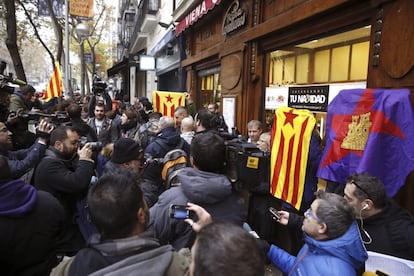A blatant provocation
Burning photos of the Spanish king is discourteous, but it shouldn’t be a criminal offense
The far-left, pro-Catalan independence fringe group Popular Unity Candidacy, better known as CUP, which holds the balance of power in the Catalan regional parliament, has been allowed to score another tiny victory in the struggle it is waging against what it sees as its principle enemy, the rest of Spain.

Burning or tearing up photographs of the Spanish monarch is nothing more than a minor act of vandalism, however CUP tries to present it: such provocations are certainly no threat to the stability of the Spanish state.
And in the face of such provocations, arresting members of CUP is simply fanning the flames of a very small fire. The authorities in this country need to stop hauling up before the High Court such provocateurs and thus deny them their five minutes of patriotic glory. It makes no sense to use the courts to pursue acts of vandalism as though they were attacks on our democracy. Parties such as CUP are no threat: our Constitution has withstood greater perils over the last 38 years. Quite simply, we must not allow our judicial system to be dragged by such people into a spiral of reaction and counter-reaction.
CUP is no threat: our Constitution has withstood greater perils over the last 38 years
Which is not to say that Spanish society as a whole should not condemn CUP for burning or tearing up photographs of King Felipe VI. In this regard, the head of the Catalan parliament has failed to live up to his responsibilities. Regional premier Carles Puigdemont has argued that nobody should be “criminalized” for burning a photograph or a flag, saying that this is a fundamental right of freedom of expression. What he fails to understand is that this isn’t about denying the rights of CUP, but the way in which its members have expressed themselves, notably by tearing up photographs of the head of state in the Catalan regional parliament. Sadly, Carme Forcadell, the speaker of the Catalan parliament, has said nothing about this irresponsible behavior, despite the fact that it is a clear breach of the codes expected of elected representatives in public.
This latest brouhaha comes after the arrest earlier this week of three CUP activists by the Catalan regional police, the Mossos D’Esquadra, on the orders of a judge, after they refused to appear at a hearing to face charges over the burning of photographs of the king at a pro-independence march in September.
The Catalan nationalist community is increasingly concerned about the behavior of its anti-capitalist partners. The sector represented by Puigdemont, made up of people who are generally polite and well mannered, may now find itself wondering whether it really wants to spend its time coming up with justifications for the assorted shenanigans staged by its more radical colleagues, unless of course what they are really concerned about is the fragility of the current Catalan government.
The minority views held by CUP would pass unnoticed were it not for the support of the Catalan regional government. Its weak-kneed response to CUP’s provocations suggests that the administration headed by Puigdemont is under serious pressure from the radicals and that efforts by the central government in Madrid to initiate a dialogue with Barcelona will come to nothing.
What these latest incidents show is that the independence movement in Catalonia is not a single, powerful force, but one made up of several, and increasingly confused, strands.
English version by Nick Lyne.
Tu suscripción se está usando en otro dispositivo
¿Quieres añadir otro usuario a tu suscripción?
Si continúas leyendo en este dispositivo, no se podrá leer en el otro.
FlechaTu suscripción se está usando en otro dispositivo y solo puedes acceder a EL PAÍS desde un dispositivo a la vez.
Si quieres compartir tu cuenta, cambia tu suscripción a la modalidad Premium, así podrás añadir otro usuario. Cada uno accederá con su propia cuenta de email, lo que os permitirá personalizar vuestra experiencia en EL PAÍS.
¿Tienes una suscripción de empresa? Accede aquí para contratar más cuentas.
En el caso de no saber quién está usando tu cuenta, te recomendamos cambiar tu contraseña aquí.
Si decides continuar compartiendo tu cuenta, este mensaje se mostrará en tu dispositivo y en el de la otra persona que está usando tu cuenta de forma indefinida, afectando a tu experiencia de lectura. Puedes consultar aquí los términos y condiciones de la suscripción digital.








































